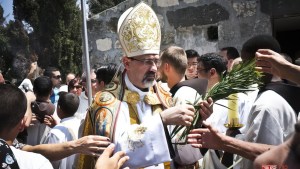Although the announcement of a ceasefire deal between Israel and Hamas is welcome, it is necessary to address the root causes of the conflict that claimed thousands of lives over the past 15 months, said Catholic leaders in the Holy Land.
Israel and Hamas, the Palestinian militant group, agreed on Wednesday to a truce that would pause the fighting, allow for release of Israeli hostages and Palestinian prisoners, and begin a process to end a war that has led to massive destruction in the Gaza Strip. [In photo above, Palestinians watch a television along a street in Khan Yunis in the southern Gaza Strip.]
On Thursday, the Assembly of the Catholic Ordinaries in Holy Land (ACOHL) — a consortium of Latin, Melkite, Maronite, Armenian, Syriac and Chaldean bishops and eparchs in Jerusalem, Palestine, Israel, Jordan, and Cyprus — issued a “Declaration of the Catholic Ordinaries on the Ceasefire in Gaza.”
The declaration welcomed the development in negotiations, expressing the hope that a ceasefire will “mark an important end to the violence that has caused immeasurable suffering.”
“It is a necessary step to halt the destruction and meet the urgent humanitarian needs of countless families affected by the conflict,” the declaration said.

Deep-rooted issues
But the bishops warned that the end of active hostilities does not mean the end of a conflict.
“It is therefore necessary to seriously and credibly address the deep-rooted issues that have been at the root of this conflict for far too long,” the bishops said. “Genuine and lasting peace can only be achieved through a just solution that addresses the origin of this long-standing struggle. This requires a long process, a willingness to acknowledge each other’s suffering and a focused education in trust that leads to overcoming fear of the other and the justification of violence as a political tool.”
The Vatican has long supported a “two-state solution” to the conflict in the Holy Land, and in 2015 signed a treaty that included recognition of the state of Palestine. The Holy See has called for Jerusalem to have a special international status. Israel claims the city as its eternal, unified capital, while the Palestinians claim East Jerusalem as their capital.
The current conflict broke out after Hamas invaded southern Israel on October 7, 2023, killing some 1,200 people and taking about 250 people as hostages. Israel responded with an air attack on Hamas positions in the Gaza Strip, followed by a ground invasion. Palestinian health authorities have said the war has claimed the lives of some 46,000 people. Hundreds of Israeli soldiers also have died.
Israel has said that it does not intentionally attack civilian positions but that Hamas often uses such places, including hospitals and schools, as cover.
The Latin Patriarch of Jerusalem, Cardinal Pierbattista Pizzaballa, said on Thursday that the ceasefire is “the necessary turning point we needed.”
“We are all very happy,” Cardinal Pizzaballa told Vatican Media’s Roberto Paglialonga. “In every context, people are happy because this war has worn us down, exhausted us, and wounded everyone’s lives.”
He said that the only thing that matters now “is that we turn the page and start addressing the severe humanitarian crisis in Gaza.”
Last fall, an international monitoring organization warned of the risk of famine in Gaza. About 85% of schools and almost 50% of the hospitals in Gaza have been destroyed.
“The hope is that this is the beginning of a process — albeit lengthy — that will, hopefully, bring lasting peace.”
“Unwavering hope”
The Catholic Ordinaries, in their declaration, expressed their hope that the ceasefire marks the “beginning of a new path towards reconciliation, justice, and sustainable peace.” They also spoke of the need for pilgrims to visit the area.
“The Holy Places are meant to be places of prayer and peace, and we long for the day when pilgrims can visit them again in safety and spiritual joy,” they said.
Tourism — including pilgrimages — is a major source of income for locals, and the war has greatly interrupted the livelihoods of so many who live in the Holy Land, not only in the Gaza Strip but in the West Bank and Israel proper.
“Despite the pain we have suffered, we continue to look to the future with unwavering hope,” the bishops continued. “May this ceasefire inspire new efforts for dialog, mutual understanding and lasting peace for all. At the beginning of the Jubilee Year dedicated to hope that does not disappoint, we read in this event a sign that reminds us of God’s faithfulness.”
The bishops concluded their declaration calling on political leaders and the international community “to develop a clear and just political vision for the post-war period. A future built on dignity, security and freedom for all peoples is a prerequisite for true and lasting peace. We urge all parties to implement the immediate steps and negotiate the future steps of the agreement in good faith.”
Said the Catholic Ordinaries of the Holy Land, “May the Lord bless this land with peace and lead us all on the path of reconciliation and healing.”
The first phase of the ceasefire is scheduled to take effect on Sunday, January 19, but Israeli Prime Minister Benjamin Netanyahu said on Thursday that the Israeli Cabinet would not vote on the deal until Hamas backs down from last-minute demands.



